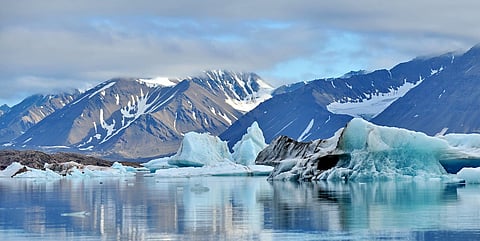

Yesterday, March 20, 2023, the Supreme Court of Norway issued a ruling upholding a decision not to grant the right to catch snow crabs on the continental shelf off Svalbard to a Latvian shipping company. According to the summary of the judgment, the case challenges the geographical scope of the Svalbard Treaty concerning the equality of nationals of the High Contracting Parties and their vessels on the continental shelf off Svalbard. In practice, this means that non-Norwegian vessels can't fish snow crabs in the Svalbard archipelago.
Latvian shipping company SIA North Star Ltd. applied in 2019 for an exemption from the ban on catching snow crab on the Norwegian continental shelf off Svalbard for three of its vessels. The Norwegian Directorate of Fisheries rejected the application in the first instance, and the Ministry of Trade, Industry and Fisheries dismissed the subsequent appeal.
The basis for the decision of both institutions was that only Norwegian citizens and vessels were entitled to catch snow crab on the Norwegian continental shelf. The Latvian company, however, found this decision, as well as the Norwegian Snow Crab Rules, to be incompatible with the equality provisions of Articles 2 and 3 of the Svalbard Treaty and appealed the decision.
Oslo District Court and Borgarting Court of Appeal then ruled in favor of the Norwegian State, so SIA North Star Ltd. appealed the latter ruling to the Supreme Court, which has now upheld both decisions by again ruling in favor of the Norwegian State and dismissing the appeal. The ruling creates case law so that, in practice, it means that foreign vessels will not be allowed to fish for snow crabs in the Norwegian Svalbard archipelago.
According to Article 2 of the Svalbard Treaty, "ships and nationals of all the High Contracting Parties shall enjoy equally the rights of fishing and hunting in the territories specified in Article 1 and in their territorial waters". However, according to the court, the main question in this case is whether the territorial waters include the continental shelf off Svalbard, and this depends on the interpretation of the Treaty.
In its ruling yesterday, the Supreme Court of Norway finds that at the time of the conclusion of the Svalbard Treaty, the term 'territorial waters' referred to the limited maritime belt off the coast over which the coastal state had sovereignty. The court also considers that there is no basis for an evolutionary interpretation of the term as applying to the continental shelf. Furthermore, the ruling considers that the Treaty's purpose of "seeing these territories provided with an equitable regime, in order to assure their development and peaceful utilization", does not support the interpretation argued by SIA North Star, but may support both parties.
Amid instability in the crab market – especially with the problems faced by Alaska crabbers – Norway announced in late November an increase in the king crab quota for 2023. "King crab is a product that fetches a very high price in the market, and increased catching of king crab will contribute to more value creation in the north", said Norway Fisheries and Oceans Minister, Bjørnar Skjæran. However, this has not yet been achieved as, according to the latest data from the Norwegian Seafood Council, Norwegian king crab suffered a drop in value in February, as did snow crab, whose export prices halved.
